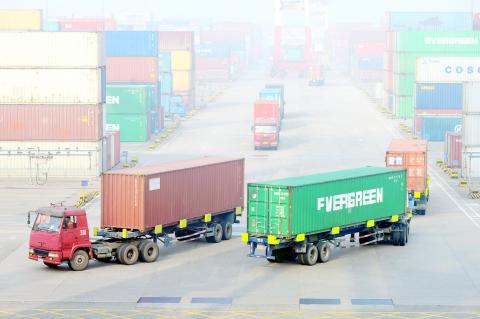A gauge of Chinese factory activity ticked up last month, but continued to indicate contraction for a fifth straight month, official data showed yesterday, as the world’s No. 2 economy heads for its worst annual growth in 25 years.
The mild improvement follows a string of stimulus measures from Beijing, including six interest rate cuts last year up to November, as well as reductions in the amount of cash banks must keep in reserve, both intended to boost lending.
The figures come as a survey showed another slight increase in new home prices last month, suggesting the government’s monetary loosening is kicking in.

Photo: AP
The official purchasing managers’ index (PMI) of manufacturing activity — which tracks activity in the factories and workshops sector — edged up to 49.7 last month from 49.6 registered the month before, which was a three-year low.
However, it was short of the 49.8 forecast in a poll of economists by Bloomberg News. Anything below 50 is considered contraction and anything above is seen as growth.
“Although the PMI slightly rebounded this month, it still lies below the critical point and is lower than historic levels over the same period,” Chinese National Bureau of Statistics senior statistician Zhao Qinghe (趙清河) said in a statement on the bureau’s official Web site.
The figures are the latest to highlight a continuing growth slowdown in the economy, which expanded 6.9 percent in July-September, the weakest rate since 2009, during the global financial crisis.
Many analysts believe the actual increase was even lower, due to factors such as the weak PMI readings.
Economists say indices such as the PMI for last month indicate that, although the government is likely to achieve its growth target of “about 7 percent” for last year, the economy nevertheless remains plagued by “substantial downside risks.”
“The improvement in the index suggests growth momentum has continued to stabilize, in part due to the government’s stimulus efforts,” Bloomberg Intelligence economist Fielding Chen (陳世淵) said. “Nevertheless, another reading below the 50 threshold ... suggests the economy stays broadly weak.”
The economy — a key driver of global expansion — grew at its slowest pace in 24 years in 2014 and eased further last year, raising concerns on global markets.
In July-September, the country logged its worst economic performance since the global financial crisis, with growth of just 6.9 percent.
A major drag on growth has been a slowdown in the property sector, which has stagnated over the past two years, with buyers priced out of the market and home sales dropping 7.8 percent in value in 2014.
However, there was some welcome news yesterday, as the China Index Academy said in a report that the average price of a new home in China’s 100 largest cities rose 0.74 percent month-on-month to 10,980 yuan (US$1,686) per square meter last month.
That represented a pickup from November’s 0.46 percent rise and is the fifth monthly increase in a row. On a year-on-year basis, prices increased 4.15 percent.
Policymakers have asked developers to “moderately cut housing prices,” among other measures, in an effort to clear unbought inventories and stabilize the property market.

Intel Corp chief executive officer Lip-Bu Tan (陳立武) is expected to meet with Taiwanese suppliers next month in conjunction with the opening of the Computex Taipei trade show, supply chain sources said on Monday. The visit, the first for Tan to Taiwan since assuming his new post last month, would be aimed at enhancing Intel’s ties with suppliers in Taiwan as he attempts to help turn around the struggling US chipmaker, the sources said. Tan is to hold a banquet to celebrate Intel’s 40-year presence in Taiwan before Computex opens on May 20 and invite dozens of Taiwanese suppliers to exchange views

Application-specific integrated circuit designer Faraday Technology Corp (智原) yesterday said that although revenue this quarter would decline 30 percent from last quarter, it retained its full-year forecast of revenue growth of 100 percent. The company attributed the quarterly drop to a slowdown in customers’ production of chips using Faraday’s advanced packaging technology. The company is still confident about its revenue growth this year, given its strong “design-win” — or the projects it won to help customers design their chips, Faraday president Steve Wang (王國雍) told an online earnings conference. “The design-win this year is better than we expected. We believe we will win

Chizuko Kimura has become the first female sushi chef in the world to win a Michelin star, fulfilling a promise she made to her dying husband to continue his legacy. The 54-year-old Japanese chef regained the Michelin star her late husband, Shunei Kimura, won three years ago for their Sushi Shunei restaurant in Paris. For Shunei Kimura, the star was a dream come true. However, the joy was short-lived. He died from cancer just three months later in June 2022. He was 65. The following year, the restaurant in the heart of Montmartre lost its star rating. Chizuko Kimura insisted that the new star is still down

While China’s leaders use their economic and political might to fight US President Donald Trump’s trade war “to the end,” its army of social media soldiers are embarking on a more humorous campaign online. Trump’s tariff blitz has seen Washington and Beijing impose eye-watering duties on imports from the other, fanning a standoff between the economic superpowers that has sparked global recession fears and sent markets into a tailspin. Trump says his policy is a response to years of being “ripped off” by other countries and aims to bring manufacturing to the US, forcing companies to employ US workers. However, China’s online warriors